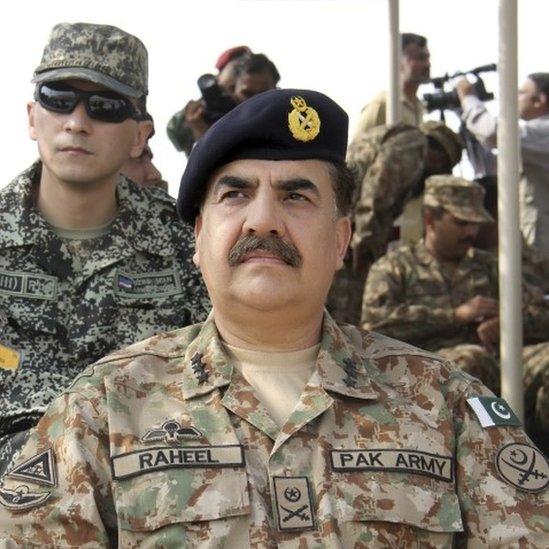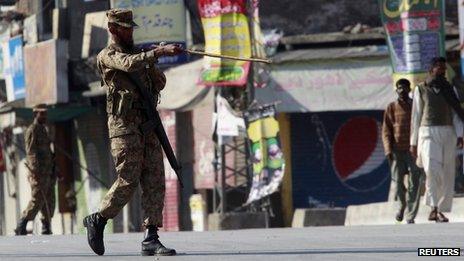Profile: Raheel Sharif, Pakistan's 'strategic' army head
- Published

While some have questioned the wisdom of Gen Sharif's appointment, there is no doubting his military credentials - he comes from a distinguished family of soldiers
Pakistani Prime Minister Nawaz Sharif has finally nominated a new army chief, choosing an officer who was number three on the seniority list.
BBC Urdu's Asif Farooqi in Islamabad says that Gen Raheel Sharif - who is not related to the prime minister - is seen by many as a straight-talking, professional soldier with no political ambitions, a factor which is of some importance in Pakistan, with its history of military coups.
But others question whether he is really the best choice.
Gen Sharif's last appointment was as the inspector-general of training and evaluation at the army headquarters in Rawalpindi.
He has also been the head of the Pakistan Military Academy (PMA) at Kakul, Abbottabad.
'Big role'
In both these positions his role was primarily to deal with the evaluation of military doctrines and war strategies - with a view to shaping future training programmes.
It is believed that the general played a key role in presiding over a change of military thinking since 2007, under which the focus of the army's work is geared more towards fighting Taliban militants rather than confronting traditional arch-enemy India.
"Sharif has played a big role in convincing the army that the Tehrik-e-Taliban Pakistan (TTP) and assorted militants inside Pakistan are as big a threat [as India]," one senior officer told the Reuters news agency.
In addition he has led the Gujranwala Corps, based at one of the army's more important corps headquarters.
Our correspondent says that he brings a sound mix of academic and field experience to the job, which many consider to be the most powerful in Pakistan.
Low intensity warfare
Those who know Gen Sharif say that during his last tenure he reshaped nearly all the important training courses, bringing them in line with the challenges of internal terrorism.

The army is seen as Pakistan's most powerful institution
He has also developed training manuals for counter-insurgency operations, an area which was not previously part of the traditional military training courses.
Gen Sharif, 57, has put many of these manuals into practice during his time at the PMA, introducing training courses in low-intensity warfare for army recruits.
During his time as the Gujranwala corps commander he introduced field exercises that focused on counter-terrorism operations.
Many believe that his role in "orchestrating" the new military thinking in the Pakistan army will enable him to cope with the forthcoming challenges more effectively.
But there are others who think his choice may not have been based purely on merit.
Some army circles say that he may have been recommended to Prime Minister Nawaz Sharif by Abdul Qadir Baloch, a retired army general and now a minister in Mr Sharif's cabinet.
Gen Baloch was a superior of Gen Sharif during his time in the army, and is known to have a liking for him.
In a recent conversation with Prime Minister Sharif, Gen Baloch is understood to have told him that he trusted Gen Sharif "more than his own children".
Other officers think Gen Sharif's family connections with Prime Minister Sharif may have influenced the decision.
But there is no doubting Gen Sharif's military credentials - he comes from a family of soldiers.
His father, Mohammad Sharif, retired as an army major while his brother, Maj Shabbir Sharif, was decorated with the country's highest military award for bravery, Nishan-e-Haider, after he died in action in the 1971 war with India.
Many say that his father had a close relationship with Prime Minister Sharif's father, Mohammad Sharif.
- Published27 February 2013
- Published23 December 2013
- Published17 March 2011
- Published25 September 2013